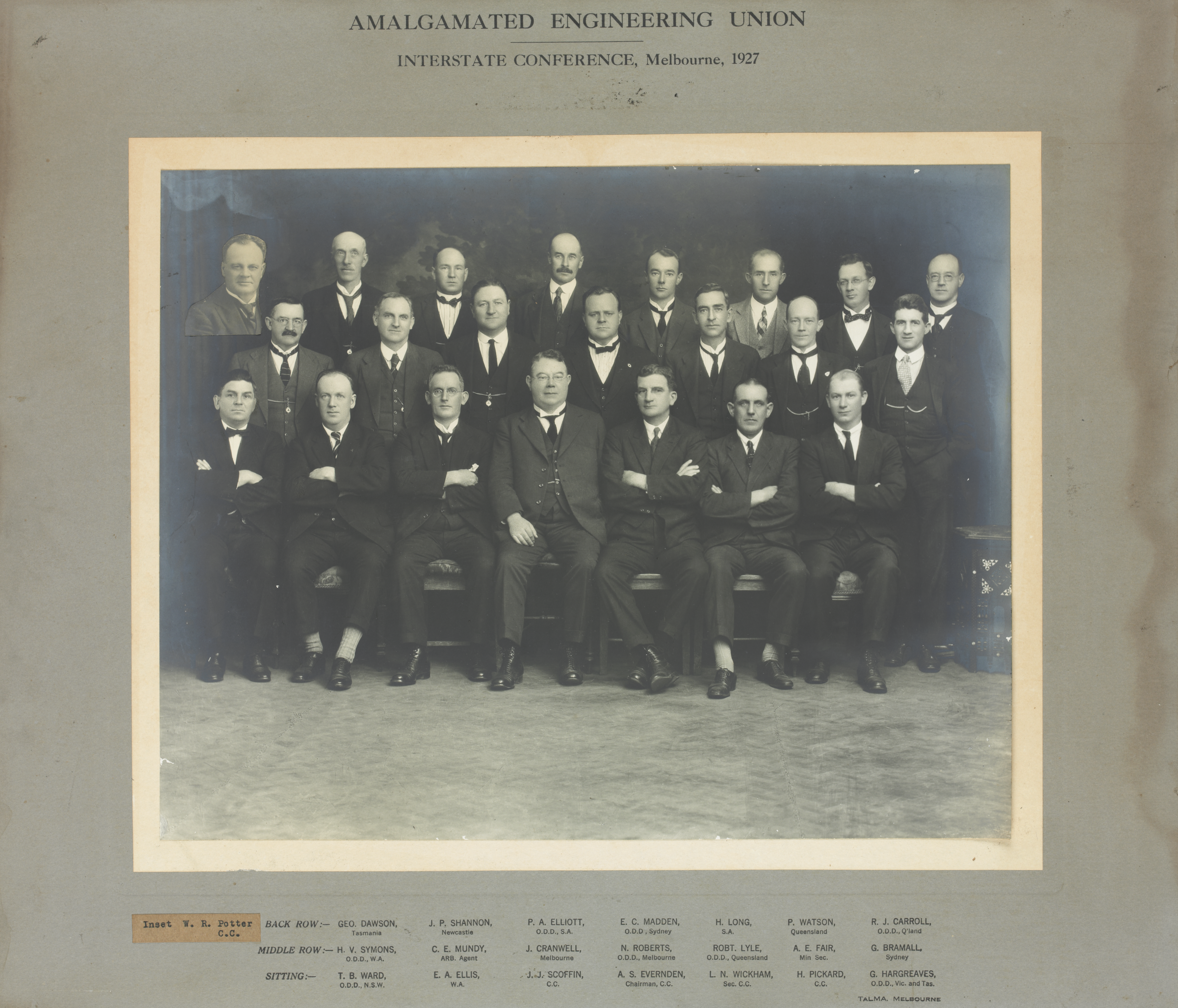Amalgamated Engineering Union (Australia) on:
[Wikipedia]
[Google]
[Amazon]
The Amalgamated Engineering Union (AEU), originally known as the Amalgamated Society of Engineers, was an Australian
 In 1921, following the amalgamation of the parent ASE union with several smaller British engineering unions, the Society was renamed the
In 1921, following the amalgamation of the parent ASE union with several smaller British engineering unions, the Society was renamed the
trade union
A trade union (British English) or labor union (American English), often simply referred to as a union, is an organization of workers whose purpose is to maintain or improve the conditions of their employment, such as attaining better wages ...
which existed between 1852 and 1973. It represented engineers
Engineers, as practitioners of engineering, are professionals who invent, design, build, maintain and test machines, complex systems, structures, gadgets and materials. They aim to fulfill functional objectives and requirements while consider ...
, as well as some other metal trades workers.
History
The first Australian branch of theAmalgamated Society of Engineers
The Amalgamated Society of Engineers (ASE) was a major British trade union, representing factory workers and mechanics.
History
The history of the union can be traced back to the formation of the Journeymen Steam Engine, Machine Makers' and Mi ...
was formed in Sydney
Sydney is the capital city of the States and territories of Australia, state of New South Wales and the List of cities in Australia by population, most populous city in Australia. Located on Australia's east coast, the metropolis surrounds Syd ...
in 1852 by 27 members of the British union who had emigrated to Australia following a lockout in Britain. While the Australian section was the first overseas branch of the union to be formed, several others were established over the course of the 19th century, including in Canada, South Africa, New Zealand and the United States.
In 1890 a breakaway group formed the Australasian Society of Engineers
The Australasian Society of Engineers (ASE) was an Australian trade union active from 1890 to 1991. It was eventually incorporated into the Australian Workers' Union (AWU).
History
In 1890, the Australasian Society of Engineers was established a ...
, dissatisfied with the union being controlled from Britain. The ASE was to continue to operate in parallel to the AEU throughout its history, and the two organisations were bitter rivals in organising engineering workers.
 In 1921, following the amalgamation of the parent ASE union with several smaller British engineering unions, the Society was renamed the
In 1921, following the amalgamation of the parent ASE union with several smaller British engineering unions, the Society was renamed the Amalgamated Engineering Union
The Amalgamated Engineering Union (AEU) was a major United Kingdom, British trade union. It merged with the Electrical, Electronic, Telecommunications and Plumbing Union to form the Amalgamated Engineering and Electrical Union in 1992.
History ...
. In February 1938 the Australian branch was deregistered, but was re-established later the same year, to be known as the Amalgamated Engineering Union (Australian Section). In 1969 the Australian branch separated from its British parent union, forming an autonomous union known simply as the Amalgamated Engineering Union (AEU). In 1972 the union began amalgamating with the Sheet Metal Working Industrial Union of Australia
Sheet or Sheets may refer to:
* Bed sheet, a rectangular piece of cloth used as bedding
* Sheet of paper, a flat, very thin piece of paper
* Sheet metal, a flat thin piece of metal
* Sheet (sailing), a line, cable or chain used to control the c ...
, the Boilermakers and Blacksmiths' Society of Australia
The Boilermakers and Blacksmiths Society of Australia (BBS) was an Australian trade union representing boilermakers and blacksmiths between 1965 and 1972.
It was established on 1 January 1966 with the amalgamation of the Boilermakers' Society o ...
and the Federated Jewellers, Watchmakers and Allied Trades Union of Australia. Between 1976 and 1983, this new union was called the Amalgamated Metal Workers & Shipwrights Union, before becoming the Amalgamated Metal Workers' Union
The Australian Manufacturing Workers Union (AMWU), officially registered as the Automotive, Food, Metals, Engineering, Printing, and Kindred Industries Union, is an Australian trade union. The AMWU represents a broad range of workers in the manu ...
(AMWU).
Constitutional Law
The ASE was famous for its involvement in the landmark 1920High Court of Australia
The High Court of Australia is the apex court of the Australian legal system. It exercises original and appellate jurisdiction on matters specified in the Constitution of Australia and supplementary legislation.
The High Court was establi ...
case
Case or CASE may refer to:
Instances
* Instantiation (disambiguation), a realization of a concept, theme, or design
* Special case, an instance that differs in a certain way from others of the type
Containers
* Case (goods), a package of relate ...
, '' Amalgamated Society of Engineers v Adelaide Steamship Co. Ltd.'', more popularly known as the ''Engineers' case'', which overturned the doctrine of implied intergovernmental immunities, significantly altering the balance of power in Australian federalism
Federalism is a mode of government that combines a general level of government (a central or federal government) with a regional level of sub-unit governments (e.g., provinces, State (sub-national), states, Canton (administrative division), ca ...
.
References
{{DEFAULTSORT:Amalgamated Society Of Engineers (Australia) Engineering trade unions Defunct trade unions of Australia 1852 establishments in Australia 1938 disestablishments in Australia Trade unions established in 1852 Trade unions disestablished in 1938 Trade unions disestablished in 1972